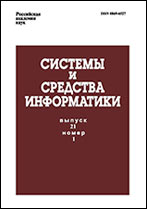|
Development of a module for grinding meshes cells in several directions and its integration into the GUI for the OpenFOAM software environment
D. I. Chitalov
South Urals Federal Research Center of Mineralogy and Geoecology of the Urals Branch of the Russian Academy of Sciences, Ilmen reserve, Miass, Chelyabinsk Region 456317, Russian Federation
Abstract:
This article is devoted to the development of a software module that extends the source code of the graphical shell rCF_GUI, created by the author, and that allows automating one of the stages of a numerical experiment for the problems of continuum mechanics — grinding cells of computational meshes in several directions. This stage is performed as a part of preprocessing of a numerical experiment and determines the accuracy of the result (final numerical model). The goal of the study and the set of tasks for its achievement are formulated. The stack of technologies necessary for development of the module is defined, its block diagram and diagram describing the logic of use are presented. The implemented module is integrated into the current version of the graphical shell rCF_GUI, which is available in the public access on the GitHub service. The module's capabilities have been tested as a part of the research with the training task of continuum mechanics in the field of aerodynamics, which is a part of the OpenFOAM software environment distribution. The results of the study are summarized, its novelty and practical significance are revealed.
Keywords:
numerical simulation, continuum mechanics, refineMesh utility, OpenFOAM, open source software, graphical user interface, Python programming language, PyQt library.
Received: 15.10.2019
Citation:
D. I. Chitalov, “Development of a module for grinding meshes cells in several directions and its integration into the GUI for the OpenFOAM software environment”, Sistemy i Sredstva Inform., 30:3 (2020), 133–144
Linking options:
https://www.mathnet.ru/eng/ssi725 https://www.mathnet.ru/eng/ssi/v30/i3/p133
|

| Statistics & downloads: |
| Abstract page: | 137 | | Full-text PDF : | 77 | | References: | 24 |
|




 Contact us:
Contact us: Terms of Use
Terms of Use
 Registration to the website
Registration to the website Logotypes
Logotypes








 Citation in format
Citation in format 